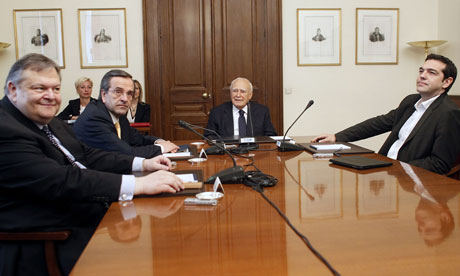Helena Smith in Athens guardian.co.uk, Sunday 13 May 2012 18.40 BST
Alexis Tsipras says he will not be 'partner in crime' with mainstream leaders, who criticise his stance as irresponsible
The Greek president, Carolos Papoulias, centre, with (left to right) the Pasok leader, Evangelos Venizelos; the New Democracy leader, Antonis Samaras; and the Syriza leader, Alexis Tsipras. Photograph: Angelos Tzortzinis/AFP/Getty Images
Hopes of producing a government to end the political deadlock in Greece were dashed on Sunday as last-ditch talks between the president and party leaders became mired in rancour and mutual recrimination.
Efforts to fill the increasingly worrying power vacuum floundered as leaders rounded on Alexis Tsipras, head of the radical leftist party Syriza, whose anti-austerity coalition emerged from inconclusive elections as the most popular force in the country. He was accused of being more interested in party politics than a way out of the quagmire.
"Syriza doesn't accept the formation of a viable government, or even to agree to support a government which would undertake to renegotiate the terms of the loan agreement," said Antonis Samaras, the conservative New Democracy leader, after discussions at the neo-classical presidential palace ended abruptly.
Evangelos Venizelos, the socialist Pasok party leader, said Syriza's "irresponsible" refusal to participate in a national unity government had put immense strain on a country whose finances were heading towards collapse.
Without cash injections from the EU and IMF, Greece would very soon be unable to pay public sector pensions and wages. If the negotiations on forming a government fail, a potentially tumultuous new round of elections looms.
Tsipras stuck to his guns, saying the political establishment wanted to lure in his party, the surprise runner-up in the elections a week earlier, as "partners in crime".
With the breakdown in talks it was uncertain whether the president, Carolos Papoulias, would summon the leaders again. The octogenarian head of state was due to meet the leaders of smaller parties, including the neo-fascist Chrysi Avgi, later on Sunday night.
The impasse arose after the mainstream New Democracy and Pasok parties were hammered at the ballot box for supporting the arduous terms of a debt relief deal drawn up by creditors to keep the heavily indebted economy afloat.
Instead, voters opted to support anti-austerity groups whose popularity has soared on the back of anger over cutbacks and reforms enforced in return for up to €240bn (£193bn) in aid. Chief among the winners was Syriza, which saw its ratings soar after promising a wholesale revision of the loan accord that Athens signed with foreign lenders.
On Sunday the new political demographic was on full display. As leaders entered the room for the talks, Tsipras assumed what some commentators described as a commanding position by choosing to sit to the left of the president, alone. Samaras and Venizelos sat opposite, exchanging strained smiles, as the much younger Tsipras bantered in front of the cameras.
The 38-year-old has much to be happy – and immovable – about. An opinion poll published on Sunday, seven days after Greece's electoral earthquake, suggested voters were bent on sending further tremors through the political landscape. The survey, conducted by Kappa Research for To Vima, showed support for Syriza climbing from 16.8% to 20.5%.
New Democracy would be projected to win 18.1% of a new vote, and Pasok 12.2%, their lowest ratings in the nearly 40 years that they have dominated Greek politics.
Emboldened by the ratings, Tsipras threw down the gauntlet, taunting his opponents to go ahead with the formation of a government. After all, he said, three parties – New Democracy, Pasok and the small pro-European Democratic Left – had agreed to form a government that would implement the unpopular policies, and with 168 MPs between them, they had a working majority.
"Those who for two years have governed us and are responsible for the situation of society and the economy have not only not got the message … they are continuing to blackmail and terrorise," he said in a statement after the talks.
"The three parties that have agreed with the goal of implementing the memorandum," he said, referring to the loan agreement, "have the majority. Let them go ahead. The demand that Syriza participate in their agreement is absurd. They are asking us to ignore the popular vote and our pre-elections pledges."
But highlighting the contradictions that have come to play in the unfolding Greek drama, an overwhelming 78.1% of Greeks said they wanted the new government to do whatever it took to retain the euro. The majority did not think Syriza's programme was the solution to rescuing Greece from the crisis.
The negotiations follow a week of abortive attempts to form a coalition as each of the three party leaders – Samaras, Tsipras and Venizelos – took receipt of an "exploratory mandate" to try to create a government.
With anti-austerity rage clearly fuelling the political dialogue, there is widespread consensus that, short of divine intervention, the president will fail in his attempts to broker a deal. He has until Thursday, when parliament is reconvened, to overcome the faultlines. If no headway is made, Greeks will return to the ballot box no later than 17 June.
Greek coalition hopes dashed as leftist leader stands firm | World news | The Guardian
![The [Greek] European Tragedy](https://blogger.googleusercontent.com/img/b/R29vZ2xl/AVvXsEiWKI5s90SFm1wWTk6bs4p7CgslaC2SnYPsrZhb-B-smOufNNCSxCvpBLI9hOB-LsXZjir_PNmEiMk2-E62F3xkg96IoC6QFAaZAnPRTVH340IN9WBRmWJqPkjWlgyRj3zpALp7h6hvA58/s920/GkBack_new.jpg)
